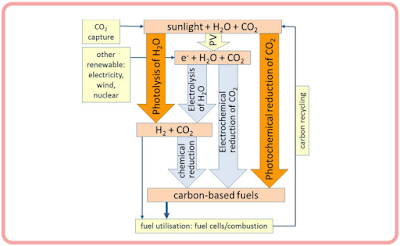At present, despite advances in the production and diversity of biobased products and the increasing use of renewable energy sources, the chemical industry depends largely on fossil carbon resources for its main energy source and feedstock. A new White Paper launched by EuCheMS and DFG on 12 September at the 6th European Chemical Congress shows how it could be possible to drive chemical reactions using the energy of the sun and help guarantee a sustainable future.
This vision of solar-driven chemistry offers a long-term innovative scientific and technological endeavour to achieve sustainable chemical production through “recycling” carbon by converting CO2 into chemicals, materials and fuels.
Such #useCO2 approaches are also a medium to long-term research and innovation priority of SusChem and are featured in the SusChem Strategic Innovation and Research Agenda (SIRA). SusChem inspired #useCO2 calls have been included in Horizon 2020 work programmes including those developed through the SPIRE PPP such as SPIRE calls 05-2016 and 08-2017.
The report was published in the same week as the 14th International Conference on Carbon Dioxide Utilization (CDU) was being held at the University of Sheffield in the UK. Today (15 September) on the final day of the conference Pierre Barthélemy, Executive Director, Research and Innovation at Cefic, will contribute to a CO2 Forum panel on 'Impacts, Policies And Strategies of CDU'. He will argue that beyond research and innovation challenges successful industrial deployment of #useCO2 technologies will require high levels of industrial symbiosis, significant investment and the right policy framework to deliver the desired impact.
Solar vision
The 'Solar-Driven Chemistry: A Vision for Sustainable Chemistry Production' paper describes how the primary feedstocks for solar-driven chemistry are water, nitrogen and carbon dioxide, while the main products would be molecular hydrogen and a series of carbon-based chemical compounds obtained through the simultaneous reduction of CO2.
Such solar-driven chemistry is a visionary concept, for which many scientific and technical problems remain to be solved. Technology transfer from fundamental chemical research to industrial applications can take decades, however, intermediate short- and medium-term objectives, which are necessary to enable the long-term goal, can also generate new knowledge, which will provide wider benefits to society and an improvement to industrial competitiveness, claims the paper.
Radical paradigm
The paper claims that solar-driven chemistry could be a radical paradigm shift in chemical production, which could have a high, positive impact on the competitiveness and sustainability of European industry. It has the potential to contribute significantly to a fossil-independent supply of feedstock for the chemical industry and to greener fuels for all applications. Solar-driven chemistry can create knowledge-driven competitiveness for Europe’s industrial production, while preserving jobs and the environment.
In order to accomplish this ambitious goal, a broad and inclusive action driven by the chemical science community is needed that requires a large integrated and synergistic approach covering catalysis, electrochemistry, photochemistry, nanosciences, in concert with semiconductor physics, engineering, biosciences and social sciences. Implementation of solar-driven chemistry is a big challenge, but one that could have a high impact for future generations, not only in science, industry and economy, but also within society as a whole, the paper concludes.
More information
The document is based on the presentations from a brainstorming workshop on ‘Solar-driven Chemistry’ that took place on 9 October 2015 in Berlin jointly organised by the Deutsche Forschungsgemeinschaft (DFG) and the European Association of Chemical and Molecular Sciences (EuCheMS).
DFG is the self-governing organisation for funding science and research in Germany whose membership includes German research universities, non-university research institutions, scientific associations and the Academies of Science and the Humanities.
EuCheMS aims to nurture a platform for scientific discussion and to provide a single, unbiased European voice on key policy issues in chemistry and related fields.



No comments:
Post a Comment
Please post your comment here. Please note that this newsblog is not moderated.
Note: only a member of this blog may post a comment.